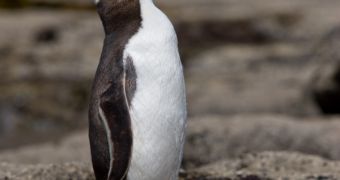While analyzing the extremely rare Yellow-eyed penguin populations in New Zealand, scientists stumbled upon bones that showed different DNA than they were expecting to find. The discovery led them to conclude that the spread of the new penguins, which are now also endangered, was favored by the fact that the Polynesian settlers, who colonized New Zealand around 1250, hunted the newly-found Waitaha penguin to extinction, along with other species.
This species is believed to have gone extinct no more than 5-600 years ago. According to historic estimates, it took about 250 years for the new settlers on the island to completely annihilate the Wautaha penguin. However, study co-author, Philip Seddon at the Otago University, said on Wednesday that, due to the fact that this extinction occurred, the new species of Yellow-eyed penguin was allowed further expansion, to the north of its regular habitat.
"In addition, it is vitally important to know how species, such as the yellow-eyed penguin, are able to respond to new opportunities. It is becoming apparent that some species can respond to things like climate change, and others cannot. The more we know, the more we can help," said David Penny, at the Massey University, in New Zealand.
Currently, researchers estimate that only some 7,000 Yellow-eyed penguins still reside in the Asian nation, and desperate international efforts are focused on preserving these populations. If the proper measures are not rapidly employed, we could see the extinction of this species as well, and very soon.
The Polynesian settlers are believed to be responsible for the extinction of the large, flightless moa bird as well, a creature that lived until AD 1400. However, Maori settlers wiped them all out within 100 years from the time they set foot in New Zealand.
Further analysis of the newly-discovered bones will provide anthropologists and archaeologists with valuable tools for understanding exactly how the Yellow-eyed penguins adapted to the disappearance of the Waitaha, which could prompt the international scientific community to come up with better plans for the preservation of the species. Hopefully, all of this will be done in time to save what's left of the rare species in New Zealand.

 14 DAY TRIAL //
14 DAY TRIAL //